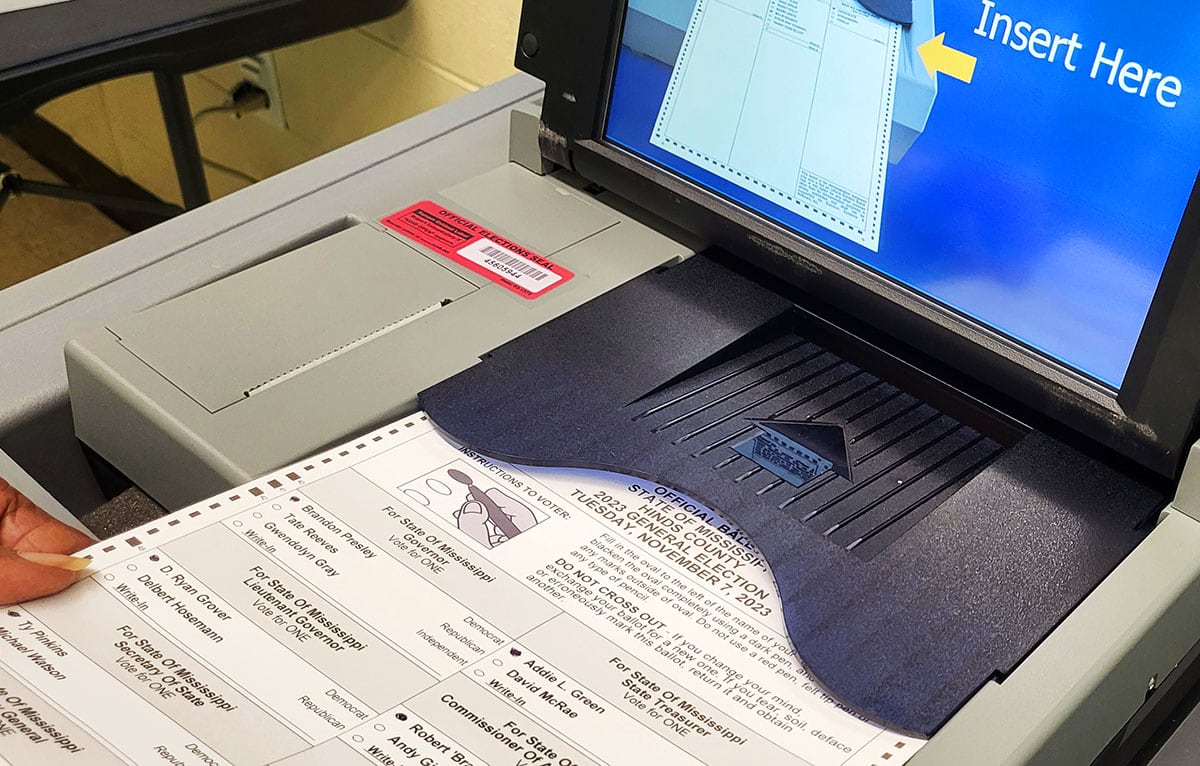Mississippi Today
State Republican Party files suit over judge holding Hinds County polls open on election night

The Mississippi Republican Party is asking the state Supreme Court to dissolve an emergency order a judge issued on election night keeping polls open in Hinds County, saying the order violated state law and the court lacked jurisdiction.
The state Republican Party filing notes the issue is spilled milk with the election over, but says the high court should make a ruling to prevent future problems and because the issues are “of great public interest.” It said conflicting court actions on election night caused confusion and run the risk of “sowing public doubt about the reliability of election results.”
On Nov. 7, there were numerous reports of Hinds County precincts running out of ballots or not having proper ballots, and voters reportedly waited in long lines or left without casting ballots. The state Democratic Party filed for an emergency order in chancery court to keep Hinds County polls open an extra hour that night. Chancellor Dewayne Thomas granted the order.
But in a separate case filed that night by Mississippi Votes, a Jackson nonprofit organization, in Hinds County Circuit Court, the Mississippi Supreme Court appointed a special judge, former Supreme Court Judge Jess Dickinson, to hear the matter. Dickinson issued an order that simply repeated existing state law: that people who were in line when the polls closed at 7 p.m. could vote if they remained in line.
READ MORE: Hinds County ballot shortages cause legal mess on Election Day
In a petition filed this week with the state high court, the Republican Party argued chancery court lacks jurisdiction to be involved in such issues, that it should have been given notice of the Democratic Party's petition that night, and that there is a lack of evidence that the ballot shortage was widespread or caused problems for many voters. The petition describes the “unknown and possibly surreptitious nature” of the Democratic Party's filing that night.
State law appears to give the state's high court exclusive power to appoint judges to hear election day disputes, and would appear to prohibit judges from dealing with such election day issues in their own counties. It says, “The Supreme Court shall make judges available to hear disputes in the county in which the disputes occur, but no judge shall hear disputes in the district, subdistrict or county in which he was elected nor shall any judge hear any dispute in which any potential conflict may arise.”
Besides this, the state GOP petition says, “Chancery courts in this state do not have the jurisdiction to enjoin elections or to otherwise interfere with political and electoral matters which are not within the traditional reach of equity jurisdiction,” quoting precedence from a previous state case.
In its filing on election night, the state Democratic Party said a large number of precincts in Hinds County ran out of ballots, “leading to long lines, extensive delays and voters leaving the polling places without voting.” It said the problem was affecting the rights of all voters and that “the relieve sought in this case is a request in equity” which would give the chancery court jurisdiction.
This article first appeared on Mississippi Today and is republished here under a Creative Commons license.
Did you miss our previous article…
https://www.biloxinewsevents.com/?p=309700
Mississippi Today
On this day in 1896


MAY 18, 1896

The U.S. Supreme Court ruled 7-1 in Plessy v. Ferguson that racial segregation on railroads or similar public places was constitutional, forging the “separate but equal” doctrine that remained in place until 1954.
In his dissent that would foreshadow the ruling six decades later in Brown v. Board of Education, Justice John Marshall Harlan wrote that “separate but equal” rail cars were aimed at discriminating against Black Americans.
“In the view of the Constitution, in the eye of the law, there is in this country no superior, dominant, ruling class of citizens,” he wrote. “Our Constitution in color-blind and neither knows nor tolerates classes among citizens. In respect of civil rights, all citizens are equal before the law. The humblest is the peer of the most powerful. The law … takes no account of his surroundings or of his color when his civil rights as guaranteed by the supreme law of the land are involved.”
This article first appeared on Mississippi Today and is republished here under a Creative Commons license.
Did you miss our previous article…
https://www.biloxinewsevents.com/?p=359301
Mississippi Today
Renada Stovall, chemist and entrepreneur
Renada Stovall sat on the back deck of her rural Arkansas home one evening, contemplating life when she had a life-altering epiphany…
“I gotta get out of these woods.”
She heard it as clear as lips to her ear and as deep as the trees surrounding her property. Stovall's job as a chemist had taken her all over the country. In addition to Arkansas, there were stints in Atlanta, Dallas and Reno. But she was missing home, her parents and friends. She also knew, she needed something else to do.
“I thought, what kind of business can I start for myself,” said Stovall, as she watered herbs growing in a garden behind her south Jackson home. Some of those herbs are used in her all-natural products. “I know when I lived in Reno, Nevada, where it's very hot and very dry, there really weren't products available that worked for me, my hair, and my skin suffered. I've got a chemistry degree from Spelman College. I took the plunge and decided to create products for myself.”

In 2018, Stovall's venture led to the creation of shea butter moisturizers and natural soaps. But she didn't stop there, and in December 2022, she moved home to Mississippi and got to work, expanding her product line to include body balms and butters, and shampoos infused with avocado and palm, mango butter, coconut and olive oils.
Nadabutter, which incorporates Renada's name, came to fruition.

Stovall sells her balms and moisturizers at what she calls, “pop-up markets,” across the state during the summer. She's available via social media and also creates products depending on what of her ingredients a customer chooses. “My turmeric and honey is really popular,” Stovall added.
“The all-natural ingredients I use are great for conditioning the skin and hair. All of my products make you feel soft and luscious. The shea butter I use comes from West Africa. It's my way of networking and supporting other women. And it's my wish that other women can be inspired to be self-sufficient in starting their own businesses.”





This article first appeared on Mississippi Today and is republished here under a Creative Commons license.
Mississippi Today
On this day in 1954
MAY 17, 1954

In Brown v. Board of Education and Bolling v. Sharpe, the U.S. Supreme Court unanimously ruled that the “separate but equal” doctrine in Plessy v. Ferguson was unconstitutional under the 14th Amendment, which guaranteed equal treatment under the law.
The historic decision brought an end to federal tolerance of racial segregation, ruling in the case of student Linda Brown, who was denied admission to her local elementary school in Topeka, Kansas, because of the color of her skin.
In Mississippi, segregationist leaders called the day “Black Monday” and took up the charge of the just-created white Citizens' Council to preserve racial segregation at all costs.
This article first appeared on Mississippi Today and is republished here under a Creative Commons license.
-
SuperTalk FM6 days ago
Martin Lawrence making 3 stops in Mississippi on comedy tour
-
Our Mississippi Home5 days ago
Beat the Heat with Mississippi’s Best Waterparks
-
SuperTalk FM2 days ago
State auditor cracking down on Mississippians receiving unemployment benefits
-
Our Mississippi Home6 days ago
Charlie’s U-Pik: Opening Soon for the Summer Season
-
Mississippi News Video4 days ago
Jackson has a gang problem
-
Kaiser Health News5 days ago
Medicaid ‘Unwinding’ Decried as Biased Against Disabled People
-
Local News1 day ago
Family files lawsuit after teen’s suicide in Harrison County Jail
-
Mississippi Today3 days ago
On this day in 1950









































